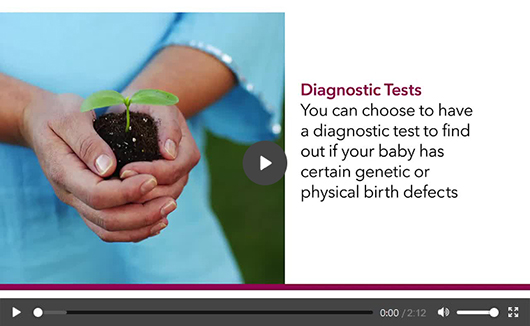Your First Visit

Congratulations on your pregnancy! This is an exciting and important time for you.
We want your first visit to exceed your expectations, and our Women’s Health Department has determined that the best time for your first appointment is around 7 weeks after your last menstrual period. This allows your provider to perform an ultrasound and see the baby. Prior to 7 weeks it is very difficult to see the baby.
During your initial visits with us, your provider will want to start developing your relationship together in order to best tailor your pregnancy experience for you. You can expect some of these things to happen early in the pregnancy during the first two visits:
- Ask you questions about your health
- Perform an exam
- Perform an ultrasound
- Order blood tests
- Discuss genetic testing options
- Make sure that you are up to date with services that keep you safe (e.g. vaccines, pap smear, etc.)
Prenatal Intake Questionnaires
The prenatal intake questionnaire will ask you questions in order to help your health care team to best tailor your care during pregnancy. Please complete it electronically before your first visit. If you did not complete this electronically, please print this out, complete it, and bring it to your first visit.
Genetic Testing
We will also be discussing genetic testing during these visits. Please review this information (English | Spanish) before your first visit as your provider will be reviewing these options with you.
Here are some other general videos about prenatal genetic testing options.
Prenatal Screening Tests
Screening tests are usually blood test(s) for you to assess the risk of certain genetic conditions. If genetic testing is desired, this is usually the testing that most couples choose. You can read more about the California Prenatal Screening Program options by reading this detailed booklet.
| California Prenatal Screening Program and Luisa’s Decision | Programa de Detección Prenatal de California: La decisión de Luisa |
California Prenatal Screening Program and Luisa’s Decision
Runtime (00:03:29)
The California Prenatal Screening Program Patient Video explains the state’s prenatal screening program including that it is voluntary. It also tells program participants what to expect from the state program, including potential screening results, and what steps to take after getting the results.
Prenatal Diagnostic Tests
Diagnostic tests involve a small procedure to obtain fetal cells but can provide more accurate results than screening tests. These are offered to you if your screening test shows a possible problem. However, they can also be appropriate as an initial test for some couples. Because they are invasive, diagnostic tests carry a slight risk of miscarriage.

Optional Diagnostic Tests | Kaiser Permanente
Runtime (00:02:12)
Some patients may be at higher risk of genetic problems (e.g. age 35 years or older at time of delivery) and may thus be eligible for non-invasive prenatal testing (NIPT). If you are eligible and considering this testing, please review the following documents about how to decide whether this is the right decision for you and how to view your NIPT results.
In addition to the above genetic testing, your prenatal blood tests will frequently include carrier screening of two genetic diseases: cystic fibrosis (CF) and spinal muscular atrophy (SMA). Some patients may also need other additional carrier status depending on their family background.
Your Guide to Maternity Services
Please take time to review this brochure which will serve as your guide to prenatal care and childbirth services in Orange County.

